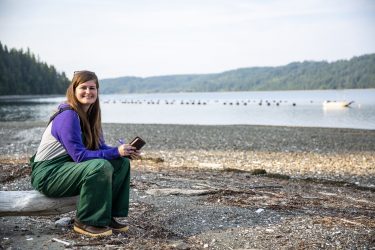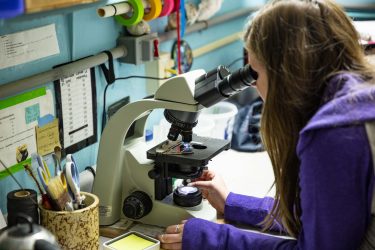As the academic year is about to get underway, we sat down with recent School of Marine and Environmental Affairs graduate Katie Keil to see what advice she might have for incoming University of Washington graduate students.

What advice would you have for incoming UW graduate students?
First and foremost, my advice would be to say “yes” to new experiences because here at UW, there are so many interesting, life-changing opportunities that are available to you. I’ve found that opportunities outside of your comfort zone provide the most growth and are the most rewarding. Working outside of your discipline will expand your horizons and provide a chance to collaborate with people outside of your program.
Sign up for that science communication workshop even if you’re introverted, present your research at that conference even if you only have preliminary findings, and apply for that research expedition even if you’re a dance major. There is so much to learn and you only have a few years.
What was one of your coolest experiences in graduate school?
One of my favorite experiences has been teaching ENVIR495C, a 9-day undergraduate backpacking course in Olympic National Park. Through this course, I help teach ice-axe training on the slopes of an unnamed mountain pass, traverse glaciers at midnight in search of ice worms, and explore challenging topics with students while hiking through old growth forests. It’s an incredibly rewarding experience, and I leave the park each summer with a year’s worth of stories.
I have also had the opportunity to go on four research cruises. One was on a VISIONS cruise off Oregon coast, where I caught glimpses of marine life thriving at depths of 2900 meters. The other three were in the Salish Sea, where I learned the art of cleaning a plankton net, cruised alongside dolphins, and sorted krill by moonlight.
What surprised you about graduate school?
I knew graduate school would challenge me in ways I couldn’t anticipate, but I’ve grown so much more academically, professionally, and personally than I could have ever hoped. All the people I’ve worked with – teachers, peers, and my students – have expanded my perspective, my interdisciplinary research taught me to think across boundaries, and the challenges of my fast-paced curriculum taught me how to set priorities and think critically. Graduate school has been really difficult, but it has been the best learning experience of my life.
Tell me a bit about your research and why it matters?
I study the impacts of ocean acidification on zooplankton here in the Pacific Northwest.

To do this, I compiled all the relevant literature examining how zooplankton respond to conditions associated with ocean acidification, such as low pH. I then combined all of the data from these papers in a statistical procedure called a meta-analysis and ranked each zooplankton from most sensitive to least sensitive.
To test the rankings I created, I went on two research cruises in Puget Sound to collect environmental and zooplankton data to determine how zooplankton were responding to ocean acidification in the field. The goal was to determine if low pH was influencing where and how many zooplankton were found at my research stations in the Sound.
This research is important because plankton are at the base of the food web, so impacts to them will reverberate throughout our entire ecosystem – ultimately impacting humans, too. My research helps determine which zooplankton species are the most sensitive to these changes and in what way(s) they’re sensitive, so scientists and managers can better understand and anticipate the types of impacts ocean acidification will have in the future.
You also were able to teach while here at UW. How would you describe that experience versus research, as they require different skill sets?
My experiences teaching compared to conducting research are actually really similar and require a lot of the same skills, such as patience, creativity, preparation and critical thinking to be most effective, and both come with steep learning curves and an abundance of unpredictable variables.
While teaching, my purpose is to present challenges to students and guide them so that they better understand key concepts, explore the nuances of issues, and find a passion for the communities and environments they work within. While researching, my purpose is different – I am finding my own way through challenges and seeking out others who may or may not to be able to help me answer these questions.
What is something you wish you would have taken advantage of while here at UW, but just couldn’t do it?
There is a lot of travel funding that’s available for conferences, and I would have loved to have been able to travel to share my results abroad, collaborate internationally, and experience a new country.
I would have also loved to take advantage of more of the experiential learning opportunities at Friday Harbor Labs. During my first graduate school summer, I enrolled in the Marine Mammals and Birds course at the labs and fell in love with the scientists, facilities, local marine life, and island character. I also got my boating license while there and would drive my research team to an island to study seal behavior each week – having another summer to conduct boat-based research would have been really great.
What’s next for you now as you leave UW?
Great question! I’m still working that out.
I’m really excited by the idea of working at the intersection of science, policy and management. I would love the opportunity to continue working in ocean acidification because it’s such a complex issue that requires thinking across disciplines and collaboration from everyone – agencies, industry, and researchers – to be able to move forward on solutions. It’s also a really pressing issue because we’re already seeing the impacts of it, and there’s a lot of ground to cover to adapt to and mitigate these impacts – and I love a good challenge.
I’m just very grateful to have pursued my degree at UW and couldn’t imagine a more fulfilling graduate career.

